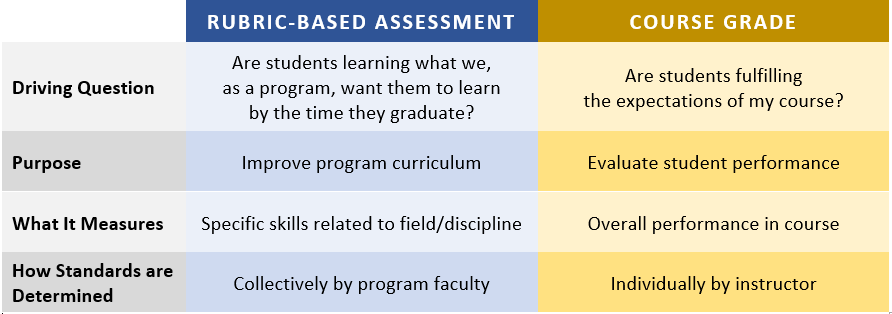What is Assessment at UCSC?
Assessment is the process of measuring student learning for the purpose of providing meaningful feedback to improve teaching and learning.
At UCSC, this process is faculty-driven and program-specific. It primarily focuses on measuring seniors’ learning outcomes but may include other courses in the program. Our faculty drive the assessment process by articulating student learning outcomes based on the curriculum and determining how these outcomes should be measured. All assessment projects are designed to include student demographics for equity analyses.
The Assessment for Learning Excellence and Equity Center supports faculty in their assessment efforts by providing resources and analytical support: one-on-one consultations on all stages of the assessment process, full analysis of the assessment data with a focus on equity, and detailed reports of results.
Want to learn more about the process of assessment? Check out the Guidelines for the Development and Assessment of Program Learning Outcomes, or click through our step-by-step guide.
Why is Assessment Important?
Engaging in systematic assessment is important because the landscape of teaching and learning is constantly changing. Our campus has experienced substantial growth and demographic changes in the student population. What worked for UCSC students ten years ago may not work for today’s students. It is through assessment that we will discover what is working well, and for which students.
Moreover, engaging in meaningful and regular assessment can positively impact students, faculty, and the institution more broadly:
| Benefits of Assessment | |
|
STUDENTS
|
|
|
FACULTY
|
|
|
INSTITUTION
|
|
Finally, by explicitly focusing on equity in learning outcomes, assessment efforts provide key evidence and support for HSI and first-generation student success initiatives.
What is Equity-Minded Assessment?
At UCSC, our approach to assessment is explicitly equity-minded—we work to support the academic success of every student at our institution, across first-generation status, gender, race, ethnicity, nationality, transfer status, and/or language background.
As part of our approach, the ALEE Center disaggregates data based on students’ background characteristics in order to examine whether students from all subgroups are reaching expected levels of proficiencies in each relevant skill. These analyses allow us to identify specific opportunities and propose actionable ways to improve equity.
How is Assessment Different from Grades, GPA, or Standardized Tests?
Assessment provides information that is substantially more useful for teaching, course planning, and curriculum development than course grades, GPA, or standardized tests. Simply put, assessment answers a different question.
Rubric-based assessment reveals the extent to which students have mastered specific skills that were collectively deemed important by program faculty. These results can then be used to identify specific strengths and areas of potential improvement in the program curriculum.
In contrast, course grades reflect students' overall performance in a course, and are based on individual instructor standards. Even if a course is designed to address a specific PLO, course grades typically measure the gradual attainment of that skill, may be curved based on overall student performance, and often include other factors such as student in-class participation, attendance, timely submission of homework assignments, etc. Ultimately, course grades cannot provide the specific information needed for program improvement.
Visual learner? See the "Assessment vs. Course Grade" comparison chart below.





